

Armed Forces Physiotherapist Career Guide - Defence Jobs. What's it really like?
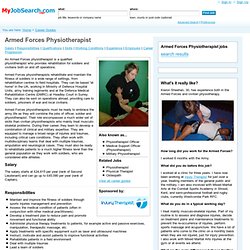
Kieron Sheehan, 30, has experience both in the Armed Forces and civilian physiotherapy. How long did you work for the Armed Forces? I worked 6 months with the Army. What did you do before this job? I worked at a clinic for three years. What do you do in a typical working day? I treat mainly musculo-skeletal injuries. Defence Force physiotherapy. Overseas deployment Military physiotherapists can be deployed overseas to areas where the Australian Defence Force is operating.
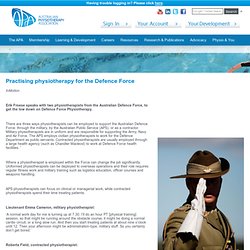
Cameron: ‘I started in uniform in 2008. I was posted to the Gallipoli barracks at Enoggera, at the 2nd Health Support Battalion, and then went off and did my basic training officer course, and a logistics course as well. I’ve been lucky enough to be posted here [in Brisbane]… and then I [was] in Afghanistan for nine months in 2010, which was pretty awesome. It was great to be able to use all my training to do that… ‘It was an amazing experience… [T]he majority of the troops are at a big base, and then we have smaller troops that are at patrol bases. ‘We lost quite a few of the guys from my battalion so—well when I say quite a few, we lost six, so that was pretty hard to deal with… [I]t really changed my perspective on life quite dramatically, in a good way though.
Work in the field When deployed overseas, most physiotherapy work is done in large bases. Physiotherapy Officer. This occupation is available within the following environments: Air Force, Navy, Army.
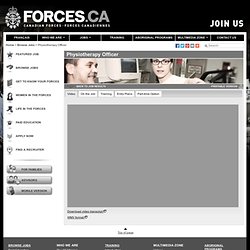
On this page: Serve with the Reserve Force The role of the Canadian Forces Health Services Reserves is to provide trained personnel to support, augment and sustain Canadian Forces Health Services organizations for Forces operations and training activities, while building and maintaining links between the Forces and the local community. As a health care professional in the Health Service Reserves, you must have an unrestricted licence to practise in your clinical field (including certification in your specific specialty) and have the ability to maintain clinical currency within your civilian workplace. This position is available for part-time employment with the Primary Reserve as a member of the 1 Canadian Field Hospital Detachment Ottawa.
Part-time Employment Reserve Force Training Reserve Force members are trained to the same level as their Regular Force counterparts. Working Environment Get Started! Recent Experiences and Challenges of Military Physiotherapists Deployed to Afghanistan: A Qualitative Study. Custom Designed Prosthetics for Military Soldiers. Progress Through Military Prosthetics This is one of the prototype foot prosthetic devices at the Medical Center Prosthetics center.
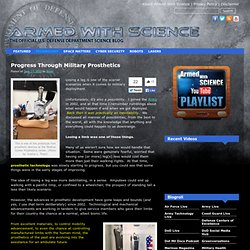
(Photo by Jessica L. Tozer) Losing a leg is one of the scarier scenarios when it comes to military deployment. Unfortunately, it’s also a possibility. I joined the Army in 2002, and at that time I remember rumblings about what would happen if and when we got deployed. Losing a limb was one of those things. Many of us weren’t sure how we would handle that situation. The idea of losing a leg was more debilitating, in a sense.
However, the advances in prosthetic development have gone leaps and bounds (and yes, I use that term deliberately) since 2002. Just a few of the different iterations of bionic joints at the Medical Center Prosthetics. From excellent materials, to control mobility advancement, to even the chance at controlling manufactured limbs with the human mind, the prosthetics of the past are evolving into the assistance for an ambulate future. But don’t just take my word for it… Medical Support Officer (Physiotherapist) Medical Support Officer (Physiotherapist) - RAF Careers. Physiotherapists form a sub-branch of the Medical Support Officer (MSO) branch of the Royal Air Force Medical Services.
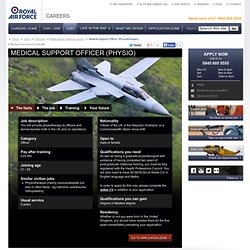
Depending on your professional experience, you could be employed in a variety of challenging clinical or management roles. You may find yourself in a hospital setting dealing with acute medical and surgical cases, or perhaps in one of our primary care rehabilitation facilities, caring for injured military personnel. There’s also the opportunity to work on a front-line operational base, at a Regional Rehabilitation Unit or at the nationally renowned centre of excellence at the Defence Medical Rehabilitation Centre at Headley Court in Surrey. It’s highly likely that you will be deployed in support of a military campaign, where you’ll provide essential care to front-line personnel in the most challenging of environments.
Qualifications and experience You must be a graduate physiotherapist and registered with the Health Professions Council. Personal qualities.